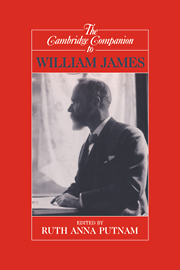Book contents
- Frontmatter
- Introduction
- 1 Pragmatism and introspective psychology
- 2 Consciousness as a pragmatist views it
- 3 John Dewey's naturalization of William James
- 4 James, Clifford, and the scientific conscience
- 5 Religious faith, intellectual responsibility, and romance
- 6 The breathtaking intimacy of the material world
- 7 James, aboutness, and his British critics
- 8 Logical principles and philosophical attitudes
- 9 James's theory of truth
- 10 The James/Royce dispute and the development of Jarnests "solution"
- 11 William James on religious experience
- 12 Interpreting the universe after a social analogy
- 13 Moral philosophy and the development of morality
- 14 Some of life's ideals
- 15 “A shelter of the mind”
- 16 The influence of William James on American culture
- 17 Pragmatism, politics, and the corridor
- 18 James and the Kantian tradition
- Bibliography
- Index
3 - John Dewey's naturalization of William James
Published online by Cambridge University Press: 28 May 2006
- Frontmatter
- Introduction
- 1 Pragmatism and introspective psychology
- 2 Consciousness as a pragmatist views it
- 3 John Dewey's naturalization of William James
- 4 James, Clifford, and the scientific conscience
- 5 Religious faith, intellectual responsibility, and romance
- 6 The breathtaking intimacy of the material world
- 7 James, aboutness, and his British critics
- 8 Logical principles and philosophical attitudes
- 9 James's theory of truth
- 10 The James/Royce dispute and the development of Jarnests "solution"
- 11 William James on religious experience
- 12 Interpreting the universe after a social analogy
- 13 Moral philosophy and the development of morality
- 14 Some of life's ideals
- 15 “A shelter of the mind”
- 16 The influence of William James on American culture
- 17 Pragmatism, politics, and the corridor
- 18 James and the Kantian tradition
- Bibliography
- Index
Summary
William James was John Dewey's philosophical hero, because his “biological psychology” of the 1890 The Principles of Psychology led Dewey out of bondage in the land of Hegel and into the wonderful land of naturalism. Dewey attempted to repay his debt by passionately expounding and defending James's philosophy over a period of fifty-one years, stretching from 1897 to 1948. While not calling into question the philosophical brilliance of these essays, it will be shown that they gave a blatantly distorted, self-serving account of James's philosophy, the basic aims of which were to despookify and depersonalize it so that it would agree with Dewey's naturalism and socialization of all things distinctively human. The intent of my “exposé” of this act of hero worship-turned-philosophical usurpation, however, is to bring into bold relief the salient features of their philosophies by highlighting their deep-seated differences. Because of the limitations of space, only Dewey's attempted naturalization of James will be considered.
“Naturalism” has meant very different things to different philosophers. Since my claim is that Dewey attempted to make James into “a good naturalist like himself,” it is Dewey's sense that is relevant. His naturalism comprises two components. First, there is no ontological dualism between the mental and the physical, be it in the form of an irreducible mentallphysical substance or a mental1 physical event dualism, psychological states and processes being reducible to certain distinctive ways in which an organism interacts with its natural environment. This is called “biological behaviorism” by Dewey and is invidiously contrasted with a “physiological behaviorism” that understands mental phenomena exclusively in terms of physical processes and states within the organism.
- Type
- Chapter
- Information
- The Cambridge Companion to William James , pp. 49 - 68Publisher: Cambridge University PressPrint publication year: 1997
- 8
- Cited by

